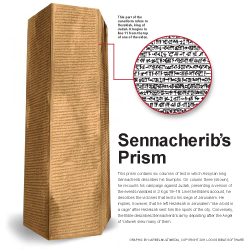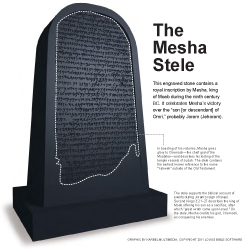8:1–6 The narrative of ch. 8 continues the story of the Shunammite woman from earlier. Elisha had prophesied that she would have a son; later, Elisha would raise him from the dead (4:8–37). Both the woman’s landholdings and her ability to appeal directly to the king attest to her position as a wealthy woman (4:8). |
8:1 dwell as an alien wherever you can People often migrated in times of famine to escape hunger (see Gen 12:10; 26:1; Ruth 1:1).
8:2 the land of the Philistines Philistia was on the southern part of Israel’s Mediterranean coast. The woman’s sojourn into Philistine territory suggests that the famine was not widespread.
was on the southern part of Israel’s Mediterranean coast. The woman’s sojourn into Philistine territory suggests that the famine was not widespread.
8:3 appeal to the king for her household and for her properties The circumstances of the woman’s loss are unclear, but apparently another party had claimed her land while she was gone. The Shunammite’s direct appeal to the king and the absence of a third party in the narrative suggest that the royal government had seized the property. See note on 2 Kings 6:26.
8:4 Gehazi Elisha’s servant, whom he struck with leprosy in 5:27.
the man of God Refers to Elisha. Compare note on 1:9.
8:5 this is the woman The woman’s case is settled favorably because Gehazi happened to be telling the king how Elisha restored her son to life at the moment she comes to appeal.
8:7–15 The narrative refocuses on Aram (Syria). Hazael’s reign in Aram (Syria) surfaces in Assyrian inscriptions dating to the period of his rule (843–796 bc); they refer to him as Hazael of Damascus, “son of a nobody,” who suffers a humiliating defeat at the hands of the Assyrians because he fights without the support of his allies. The biblical story of Hazael’s rise to power describes his atrocities against Israel. |
8:7 to Damascus The capital city of Aram (Syria).
Ben-Hadad king of Aram See note on 6:24.
8:8 Take a gift in your hand Taking a gift to a prophet when seeking advice or intercession was common practice (e.g., 1 Sam 9:7; 1 Kgs 14:3).
8:9 a load on each of forty An amount worthy of royalty and likely intended to overwhelm the accommodations wherever the prophet was lodging. This description is likely an exaggeration, especially in comparison to the modest gift of bread, cake, and honey that Jeroboam’s wife offers Ahijah in 1 Kgs 14:3.
Your son Through his messenger (Hazael), Ben-hadad addresses Elisha as a son would address his father, showing great respect for the prophet.
8:10 Here, Elisha prophesies to Hazael that Ben-hadad will recover but still die. The narrative of 2 Kings seems to imply that Ben-Hadad would have recovered and Elisha’s prophecy would have been fulfilled if Hazael had not murdered him so soon (see 2 Kings 8:15 and note). |
8:12 You will set their fortifications on fire Elisha’s poetic description of Hazael’s later attack is similar to that found in the book of Amos (Amos 1:3–4, 13). For the account of Hazael’s attack, see 2 Kgs 10:32; 13:7.
(Amos 1:3–4, 13). For the account of Hazael’s attack, see 2 Kgs 10:32; 13:7.
8:13 your servant, who is like a dog Dogs were despised and viewed as scavengers in the ancient Near East (Exod 22:31). Referring to someone as a dog was a harsh insult (1 Sam 17:43; 24:14).
great thing The Hebrew term used here conveys the sense of “exceptional” or “extraordinary” (see Deut 4:32; 1 Sam 12:16).
8:15 bed cover The meaning of the Hebrew word here is uncertain, but it may refer to meshed, netted work (see Exod 27:4; 38:4; 1 Sam 19:13, 16).
he died It seems that Hazael murders Ben-hadad by suffocating him (compare note on 2 Kings 8:10).
8:16–24 The narrative transitions from the nation of Aram (Syria) and focuses on Jehoram, king of Judah. Although both a king of Israel and Judah went by the same Hebrew name, yehoram (Jehoram), which is also rendered as yoram (Joram), they are two different kings (compare note on 1:17). |
8:16 son of Jehoshaphat became the king of Judah The chronological information given here seems to conflict with earlier statements, suggesting a period of coregency might be involved. See note on 1:17.
Southern King | Date |
Asa | 910–873 bc |
Jehoshaphat | 873–848 bc |
Jehoram | 848–841 bc |
8:17 Jerusalem Capital city of the kingdom of Judah.
8:18 as the house of Ahab had done Just as David was the standard for uprightness (see 1 Kgs 9:4 and note), Ahab serves as the standard for evil behavior (2 Kgs 21:3).
the daughter of Ahab became his wife Portrays Jehoram, king of Judah, as another ruler who does evil under the influence of a foreign wife (along with Solomon in 1 Kgs 11:1–10 and Ahab in 1 Kgs 16:31).
8:19 as he had promised to give him a lamp Refers to Yahweh’s promise to Solomon to preserve one tribe for his son to rule (1 Kgs 11:11–13). Here and elsewhere in 1–2 Kings and 1–2 Chronicles, references to this promise use the Hebrew word nir, which denotes a lamp and can signify life and hope (1 Kgs 11:36; 15:4; 2 Chr 21:7; compare 2 Sam 21:17).
8:20 they set up a king Edom had been without a king for an undetermined amount of time. It had been suppressed by Judah, who had set up a deputy to rule there (1 Kgs 22:47).
8:21–24 The Hebrew text of this passage can be confusing, as it uses the variant rendering yoram (Joram) in reference to yehoram (Jehoram), king of Judah. Starting in 2 Kings 8:25, the narrative shifts its focus to a king of Israel who also goes by the name yoram (Joram). Compare note on 1:17. |
8:22 Libnah A Levitical city in the hill country of Judah (Josh 21:13). Libnah is later attacked during the Assyrian king Sennacherib’s campaign against Judah (2 Kgs 19:8). Josiah’s wife, Hamutal, comes from this town (23:31; 24:18).
8:23 the events of the days of the kings of Judah See note on 1:18.
8:24 slept with his ancestors This idiom means to die peacefully. Sometimes it refers specifically to burial in a family plot (e.g., Gen 47:29–30).
8:25–29 The narrative continues by describing the reign of another king of Judah, Ahaziah; the narrative uses the reign of Joram, king of Israel, as a reference point for the chronology, and then proceeds to describe an alliance between the two kings. |
8:25 Ahaziah This king of Judah, who reigned ca. 841–840 bc, shares the same name as an earlier king of Israel (who reigned ca. 853–852 bc; 1 Kgs 22:51–2 Kgs 1:18).
Joram Although the two kings are sometimes called by the same name, this king of Israel is distinct from the king of Judah, Jehoram, also mentioned in this verse. See note on 2 Kings 8:21–24.
8:26 Athaliah The daughter of Ahab whom Jehoram, king of Judah, married (see v. 18 and note). The Hebrew text here and in 2 Chr 22:2 literally refers to Athaliah as the daughter of Omri, but this seems to be a reference to her being Omri’s descendent (his granddaughter). Athaliah is described in 2 Chr 22:3 as the counselor to Ahaziah in acting wickedly.
Omri, king of Israel Omri is one of the few people from the Bible whose name appears in extrabiblical sources. The Mesha Stele (or “Moabite Stone”) narrates a period of conflict between Mesha, king of Moab, and “Omri, king of Israel” (see note on 2 Kgs 3:1–27). See 1 Kgs 16:21–28.
8:27 as the house of Ahab See 2 Kgs 8:18 and note.
the son-in-law of the house of Ahab This seems to be a reference to the marriage of Ahaziah’s parents, Jehoram and Athaliah, not a reference to Ahaziah marrying someone related to Ahab (compare note on v. 18). King Ahaziah of Judah was negatively influenced by his relatives, who were from Ahab of Israel’s family.
8:28 Joram the son of Ahab The king of Israel, who is related to Ahaziah. Ahab is both Joram’s father and the father of Athaliah, Ahaziah’s mother (compare note on v. 18).
Hazael king of Aram See vv. 7–15.
Ramoth-Gilead A city on the border of Israel and Syria where Ahab, king of Israel, met his downfall during a clash with the Syrian army (1 Kgs 22).
8:29 Joram Although sometimes called by the same name in the Hebrew text, this king of Judah and the king of Israel, Joram, are two distinct people. Compare note on 2 Kings 8:25.
Jezreel Israelite city in a fertile valley with the same name. Starting with Ahab, Jezreel was the location of the Israelite king’s winter residence (1 Kgs 21:1).

|
About Faithlife Study BibleFaithlife Study Bible (FSB) is your guide to the ancient world of the Old and New Testaments, with study notes and articles that draw from a wide range of academic research. FSB helps you learn how to think about interpretation methods and issues so that you can gain a deeper understanding of the text. |
| Copyright |
Copyright 2012 Logos Bible Software. |
| Support Info | fsb |
 Loading…
Loading…






